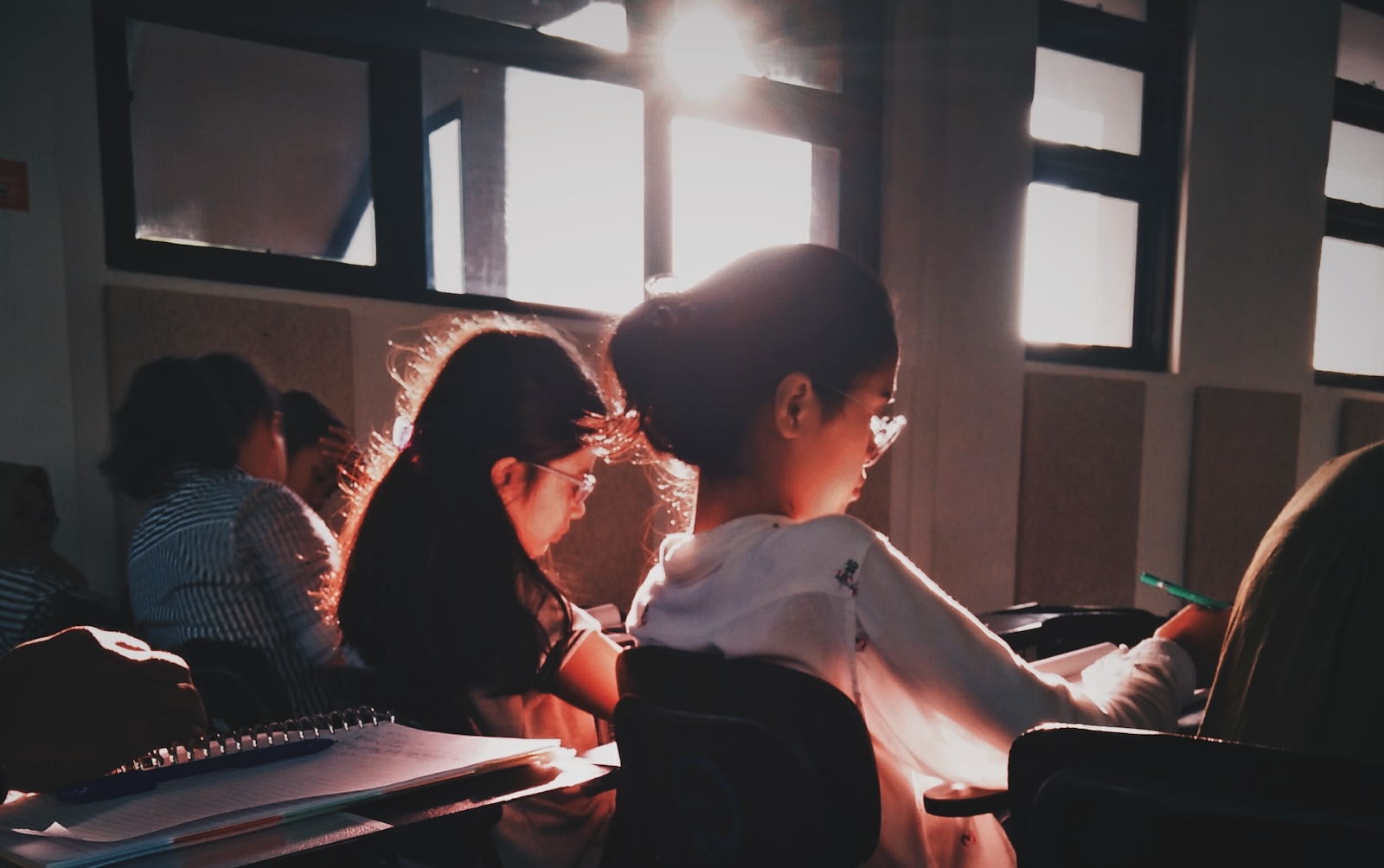The Lay of Our Land by Angela Belcher Epps

I’m finally hitting my stride after last semester’s rocky start. It was a maddening experience because everything looked great on paper. My lesson plans aligned so perfectly with the State standards for high school English that the principal actually shared them at four faculty meetings.
But all that by-the-book planning got me nowhere with my sixteen- to twenty-one-year-old students. Every single day, I did everything short of tap-dancing to keep them engaged. For reading parts in a play or sharing an essay, I bribed them with retro candy ordered online: Sugar Daddy’s, Boston Baked Beans, Tootsie Roll Pops, and such. Kinds they couldn’t buy at the convenience store.
Still, a solid half or my twenty-plus students only pretended to work. They concealed phones inside reading materials or on their laps beneath the desks—eyes angled down, hands hidden. School social media blocks no match for their hacking abilities.
My colleagues didn’t so much offer solutions as commiserate.
Then during Finals Week, seconds before the announcement to lock our doors and start testing, Darren, a chronic absentee, rushed in. “Morning Ms. Roberts. I came for your test. I hear it looks bad for y’all if we don’t show. I might not pass, but I’ll take it for you.”
“Awwww. Thank you Darren. I appreciate that,” I said.
“Yeah. Well. You always let me in and let me stay after to make up work and stuff.”
“That’s because you never, ever give up,” I said.
He half smiled with a melting warmth in his eyes. “Nah. I don’t.”
“That’s an awesome quality that will take you far in life.”
“Wow. Thanks Ms. Roberts.” He full out smiled all the way to his seat.
In that moment, I glimpsed something simple and important: Darren is a kid inside a six-foot body. All my students are still so young. They have so much to learn—not just about English, but about the world, about themselves.
Ah! Ha!
Now it’s the third week of second semester. I’ve watched my new students closely and found something uniquely positive to say about each one. During one-on-one goal-setting meetings, I surprise them with their asset:
You have the loveliest handwriting. Most people can’t even write cursive.
Your posture is amazing.
You’re the fastest typist I’ve seen for someone who doesn’t get paid for it.
Your voice carries clear to the end of the hall.
You’re a natural born communicator.
Your warrior spirit is amazingly strong.
Everything I say is true. Even the sourest pessimists give me a happy smirk.
And joy of all joys, for the most part, most of them are working most of the period.
I tell Lila—who sits in the back and never raises her hand, “Your essay responses are so thoughtful. And what a vocabulary. I’ll adapt your tests so you can expound.”
“Okay. I like to write.” She decorates her papers with intricate doodles and the faces of big-eyed girls.
Two days after I tell her that, Lila knocks during my planning period. She has the hall pass from her math class. She comes in, sits on the desk across from me, swings her legs, talks without taking a breath until I remind her that she’ll fall behind in math if she doesn’t get going.
She covers her grin with a hand hidden by ridiculously long, trendy sleeves.
Our school is reserved for students who tanked irreparably in the general public high school. But so many are wickedly charming, quirky, or creative. When Lila shares stories about her grandma who bakes and sews, I seriously wonder how she managed to get accepted.
She brings an elaborate square of grandma’s quilt-in-progress to show me.
“I sew!” I tell her. “Tell Grandma I’m impressed.”
“We’re all artists,” Lila beams. “Me, my sister, and Grandma.”
She aces all the assignments I adapt. I consider making her my classroom assistant because all our students need skills for future employment.
Five weeks in, Lila stops by at the end of the school day. “It’s like a pizza,” she says. Suddenly, she has watery, hound dog eyes threatening to spill tears. She can’t stop talking about her face—a fine face actually—just a little pimply.
“Breakouts and adolescence go hand in hand, Lila. It’s just hormones. Don’t worry so much. Let’s find you a good book that holds your attention.”
Together we peruse my classroom library. She seems buoyed by my pep talk. Says she’ll read in bed until she falls asleep. I remember the angst of being sixteen and self-conscious. Of being clueless about how to make things better. I feel intense satisfaction. I am meeting her where she is and helping her along.
But my help is fleeting. She now wants to talk about her face day after day. She knocks at my door with emergency blazing in her eyes.
Her anxiety penetrates the boundaries I’ve been warned to keep. As she talks, my shoulders hunch, and my brain seems to pulse as I struggle to keep up with her emotional leaps and dives. “I’m concerned, Lila,” I say. “I don’t like you worrying so much. Is it okay if I tell Ms. Moore to talk to you? She’s really caring. The girls love her.”
“Okay,” she says.
And I do tell Ms. Moore, the school social worker. Ms. Moore assures me that Lila has bonded with me. “That’s important to build her confidence,” she says. “She knows you appreciate her creativity.”
I’m disappointed. That bond hasn’t been enough to keep me from having to refer her. I wonder what more I might have done.
There’s a welcome quiet that accompanies my Friday afternoon test sessions. Phones are face-down on the corners of their desks. Easily distracted students are plugged into clunky noise-canceling headphones. I stroll through the classroom at a turtle’s pace, lingering over a tester for a moment to give a thumbs-up or a duck-down to say Write two or three more sentences.
I glance across the room and notice Lila staring straight ahead, pressing a red pen against her face. I mouth the words, “Get busy, ma’am.” But she isn’t looking in my direction.
I slowly continue my rounds.
I approach Lila’s desk. Her arm covers the bottom half of her face. She peers at me like I’m a stranger. The lines on her paper are blank—with none of her usual notes filling the margins of the reading selection. Instead, Lila has drawn a horrid picture of a girl bleeding from the eyes, mouth, and nose. Red splotches sprinkle the page.
Then Lila lowers her arm, reveals blood smeared across her face.
For long moments, I can’t reconcile the scene at her desk with the blissful peace of one hundred per cent student engagement. Finally I ask, “Lila, is your nose bleeding?”
She swipes the long sleeve across her nose, ignores my question, and studies the red drops on her paper like she’s just discovered them.
I survey the room. Three girls mumble to one another. A guy makes an arm pillow and rests his head like it’s naptime. Most are still reading and writing.
I can’t tell where the blood has come from. I stand frozen. I’ve done nothing, and it seems an incredible amount of time has passed.
A student shoves a handful of tissues on the desk and sits back down.
Somebody says, “Man.”
My heart thrums. I look Lila in the eyes and whisper, “I see you’re not okay, so I’m calling the office to come get you. Meet me in the hallway.”
Lila rises, her eyes round as sand dollars. She walks to the door clutching the pen and wad of bloodied sleeve in one hand, a ball of tissues in the other—the tissues still white and unused.
“You’re gonna be alright,” I say. “Be very honest with Ms. Moore, okay?”
Lila stands beside me without expression as I dial the front desk.
“This is Ms. Roberts in Room 416. Lila Horn isn’t feeling well and needs an escort downstairs immediately. Really. Immediately.”
Within the minute, the school secretary appears, says, “Come on,” and starts a chatty monologue about pizza on the menu for lunch and not knowing whether there’s sausage or pepperoni. But hopefully there’s both. That way everybody’s happy.
I don the rubber gloves that I never imagined using. Slide Lila’s pages into a folder then scrub her desk with Sani-wipes.
“You guys are terrific,” I say. “So focused and on task.”
Nobody utters a word.
I’d welcome some debriefing. We could all decompress from this event that’s happened on my watch. My heartbeat’s unstable, my flesh crawling from images of randomly smeared blood repeating in my mind.
But my students are anchored to my test. Only the hushed sounds of their highlighting passages and scribbling answers to my fifteen questions. And the soft snores of the napping boy.
How accustomed they must be to a range of irregularities.
I take deep breaths. Lean against my desk. Mentally adjust to how much I still need to learn about the lay of our land.
The End
 Angela Belcher Epps is the author of Salt in the Sugar Bowl, a novella. Her stories and essays appear in All the Songs We Sing: Celebrating the 25th Anniversary of the Carolina African American Writers’ Collective; Heartspace: Real Life Stories on Death and Dying; Gumbo for the Soul: The Recipe for Literacy in the Black Community; the North Carolina Literary Review; Workers Write; and others. She’s currently wrapping up a novel and a lessons-learned project. Find her at angelabelcherepps.com
Angela Belcher Epps is the author of Salt in the Sugar Bowl, a novella. Her stories and essays appear in All the Songs We Sing: Celebrating the 25th Anniversary of the Carolina African American Writers’ Collective; Heartspace: Real Life Stories on Death and Dying; Gumbo for the Soul: The Recipe for Literacy in the Black Community; the North Carolina Literary Review; Workers Write; and others. She’s currently wrapping up a novel and a lessons-learned project. Find her at angelabelcherepps.com
